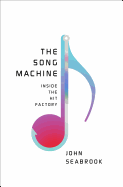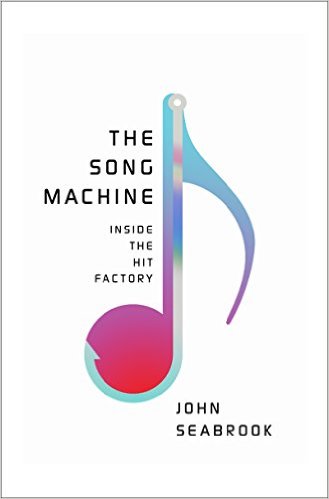 New Yorker writer John Seabrook (Flash of Genius) provides an eminently readable and important inside look at how the pop music industry developed strategies to manufacture no-fail hit songs.
New Yorker writer John Seabrook (Flash of Genius) provides an eminently readable and important inside look at how the pop music industry developed strategies to manufacture no-fail hit songs.
Seabrook's in-depth interviews with an army of songwriters, producers, performers and others make for series of profiles that document a revolution in the music business. He chronicles everything from the emergence of new business models to the deliberate interjection of hooks meant to re-engage listeners every seven seconds, the average amount of time people listen to a song before they change the station. Including optimal chord progressions and the most effective camera angles for videos, these strategies exploit the brain's reflexive attraction to repetition, rhythm and melody. Hit factories now create formula-driven, synthetic tracks with near-universal appeal, producing songs that combine beat-driven dance music with the pop that people enjoy on the radio.
Seabrook travels to Stockholm, where Swedish DJ, producer and songwriter Denniz Pop and Cheiron Studios helped the city become an engine of pop music. In South Africa, Clive Calder, through his Jive label, was the first to successfully exploit the power of producers and publishing rights, rather than focusing on performers and record sales, to become the wealthiest individual in the history of the music industry up to that point. Korea's K-pop, with one of the most elaborate hit- and teen idol-making factories in the world, has eliminated the distinction between "manufactured" music, created under the direction of producers in labs, using computer-generated instrumentals for a celebrity performer, and "real" music created by the singer-songwriter. Profiles of superstars like Rihanna, Britney Spears and Katy Perry detail their collaborations with producers who leave no detail to chance. And Seabrook's anecdotes of the music shared with (and often rejected by) his children add a wonderful personal counterpoint to the behind-the-scenes narrative.
The Song Machine is a superbly written, textured account of a creative industry still in flux, one where an artist's creative vision is no match for a deadly effective business machine. As streaming replaces CD sales and contemporary hits replace album-oriented music, and 1% of artists now generate 80% of the industry's profit, the role of the singer and writer has radically changed. They have become "vocal personalities" whose "insights into the human condition seem to extend no further than the walls of the vocal booth." Seabrook acknowledges the addictive appeal of such music while remaining troubled by the cost: music that can be performed by anyone is inherently soulless, even if it can foster brief moments of connection between a father and a son when they are both captured by a song's seductive hooks. --Jeanette Zwart, freelance writer and reviewer
Shelf Talker: The Song Machine is a superb, thoroughly researched and entertaining account of the music industry's transformation into a hit factory.






IPC.0204.S3.INDIEPRESSMONTHCONTEST.gif)




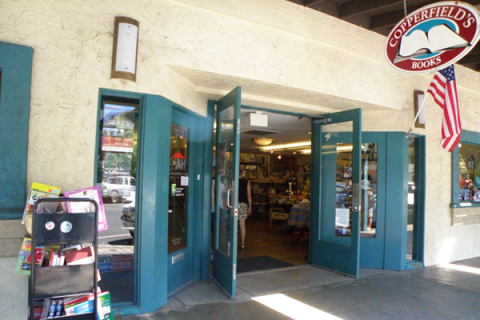 The wildfires in Northern California that
The wildfires in Northern California that 


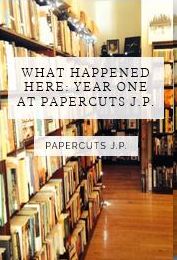 The planned anthology will include more than a dozen short pieces by writers who visited the store during its first year, as well as work from Papercuts staff members. Among the writers lined up to contribute are Edan Lepucki, author of California; Abigail Thomas, author of What Comes Next and How to Like It; and Josh Cook, author of An Exaggerated Murder. An individual pre-order costs $9.99 (a finished retail copy will cost $14.99, should the campaign be a success) and includes access to drafts and updates from the authors. Backers can also preorder multiple copies at once to unlock more rewards, such as a limited edition mug and the backer's name going in the book. Given a successful campaign, store owner Kate Layte and media and events coordinator Katie Eelman expect a publication date of February 2016.
The planned anthology will include more than a dozen short pieces by writers who visited the store during its first year, as well as work from Papercuts staff members. Among the writers lined up to contribute are Edan Lepucki, author of California; Abigail Thomas, author of What Comes Next and How to Like It; and Josh Cook, author of An Exaggerated Murder. An individual pre-order costs $9.99 (a finished retail copy will cost $14.99, should the campaign be a success) and includes access to drafts and updates from the authors. Backers can also preorder multiple copies at once to unlock more rewards, such as a limited edition mug and the backer's name going in the book. Given a successful campaign, store owner Kate Layte and media and events coordinator Katie Eelman expect a publication date of February 2016.IPC.0211.T4.INDIEPRESSMONTH.gif)
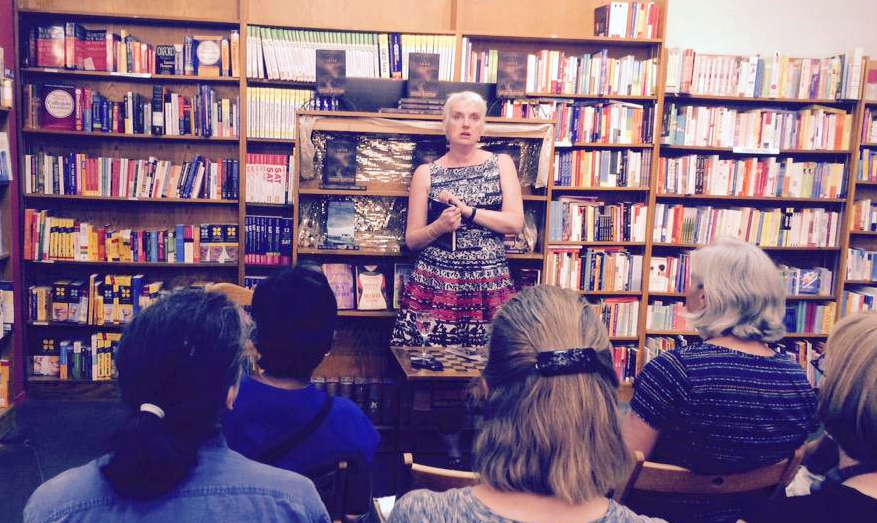 Catriona McPherson celebrated the release of her latest stand-alone thriller, The Child Garden (Midnight Ink), with a launch party at
Catriona McPherson celebrated the release of her latest stand-alone thriller, The Child Garden (Midnight Ink), with a launch party at 
 RiverRun Bookstore
RiverRun Bookstore Undermajordomo Minor: A Novel
Undermajordomo Minor: A Novel New Yorker writer John Seabrook (Flash of Genius) provides an eminently readable and important inside look at how the pop music industry developed strategies to manufacture no-fail hit songs.
New Yorker writer John Seabrook (Flash of Genius) provides an eminently readable and important inside look at how the pop music industry developed strategies to manufacture no-fail hit songs.